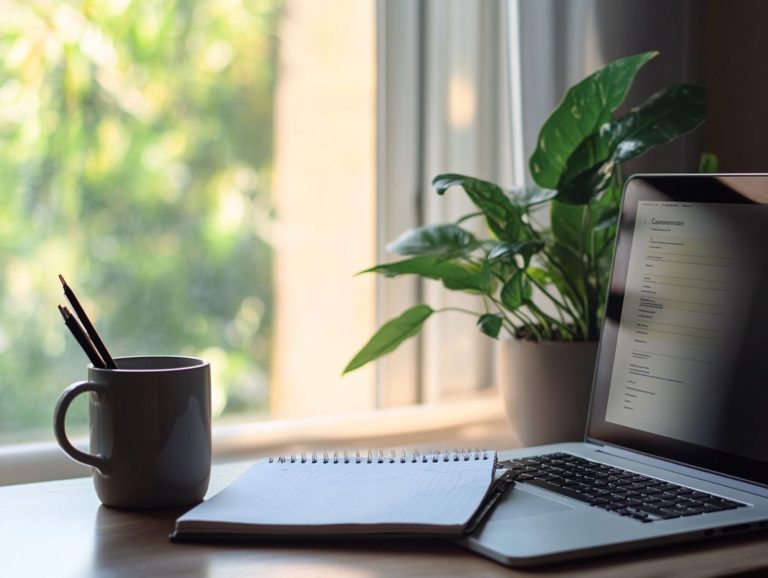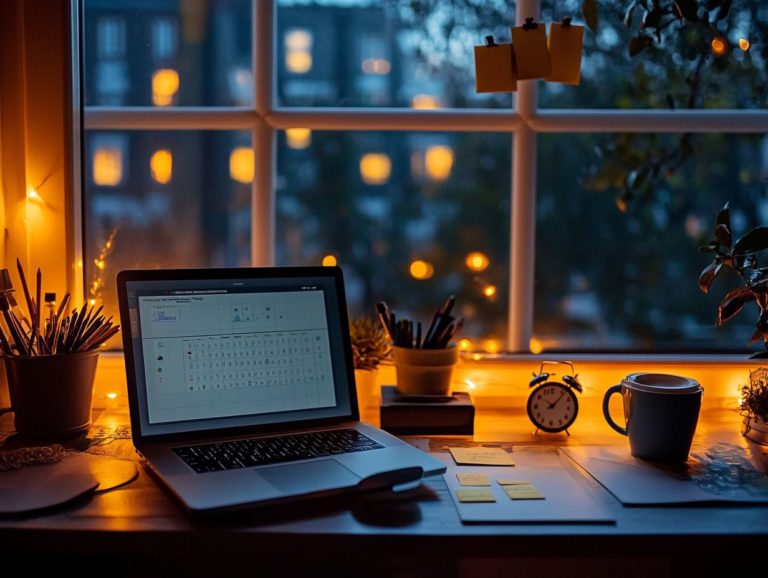Techniques for Overcoming Distractions
In today s fast-paced world, distractions are everywhere. This makes it challenging to maintain focus and productivity.
Notifications buzz constantly, and multitasking is tempting. Understanding the types of distractions is essential for your success. This article delves into the negative impact these distractions can have on your productivity and mental health while providing practical techniques to help you limit them.
You ll find insights into mindfulness practices designed to keep you present and focused. Mindfulness means being fully present and aware of your thoughts and feelings. You will also find guidance on when it might be appropriate to seek professional help.
Don’t let distractions derail your academic journey! Explore these strategies now to transform your focus and boost your success!
Contents
- Key Takeaways:
- Understanding Distractions
- The Negative Effects of Distractions
- Techniques for Limiting Distractions
- Mindfulness Practices for Overcoming Distractions
- Seeking Professional Help for Chronic Distractions
- Frequently Asked Questions
- What are some effective techniques for overcoming distractions?
- How can I create a distraction-free workspace?
- What is the Pomodoro Technique and how can it help with distractions?
- How can practicing mindfulness and meditation help with distractions?
- What are some tips for managing distractions while working?
- Why is it important to take breaks when trying to overcome distractions?
Key Takeaways:
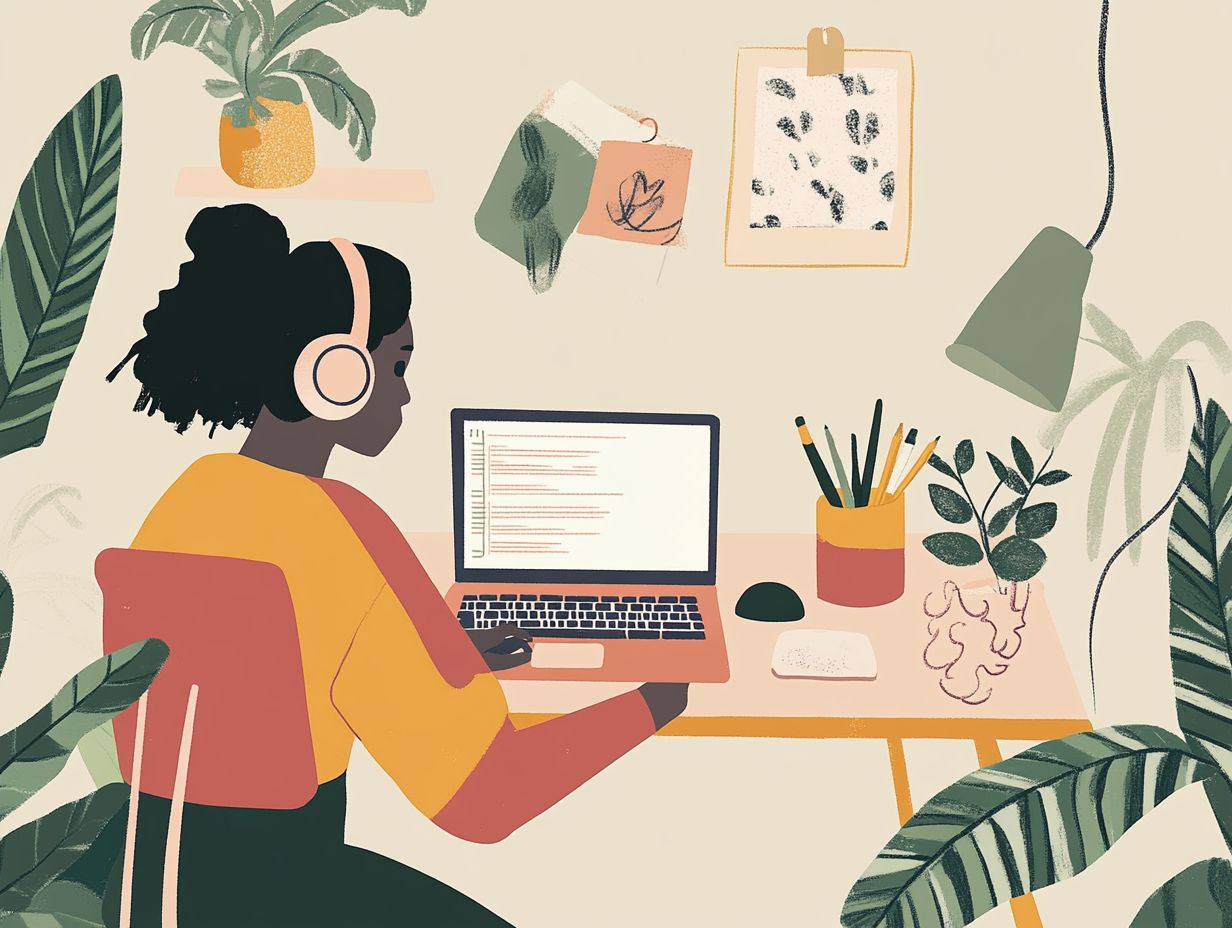
- Create a distraction-free environment and set clear boundaries.
- Use mindfulness techniques to stay focused and present.
- If distractions persist, consider seeking professional help.
Understanding Distractions
Understanding distractions is essential for you as a college student striving to make the most of your study sessions. Distractions can be divided into internal and external categories.
Internal distractions involve the thoughts and feelings that pull your attention away, while external distractions include environmental factors such as background noise, technological interruptions, and the ever-tempting allure of social media.
By recognizing and tackling these distractions head-on, you can significantly improve your focus and effectively reach your academic goals.
Definition and Types of Distractions
Distractions are those pesky interruptions that pull your attention away from what truly matters, significantly impacting your productivity as a college student.
These interruptions can be thought of in two main categories: internal and external distractions. Internal distractions come from within you, often taking the form of wandering thoughts or that nagging self-talk that drags your focus away from studying or assignments. For example, you might find yourself daydreaming about weekend plans or feeling anxious about finances, which makes it hard to concentrate.
External distractions, on the other hand, are all around you. They include noise, social media notifications, and the relentless presence of technology. A prime example would be the constant ping of your smartphone, tempting you to mindlessly scroll through social media feeds instead of tackling your homework.
These various distractions not only break your work rhythm but can also lead to a decline in motivation and overall academic performance.
The Negative Effects of Distractions
Distractions can significantly undermine your productivity and mental well-being as a college student. They often lead to heightened procrastination and a decline in personal accountability, making it essential to recognize and manage these interruptions effectively.
Impact on Productivity and Mental Health
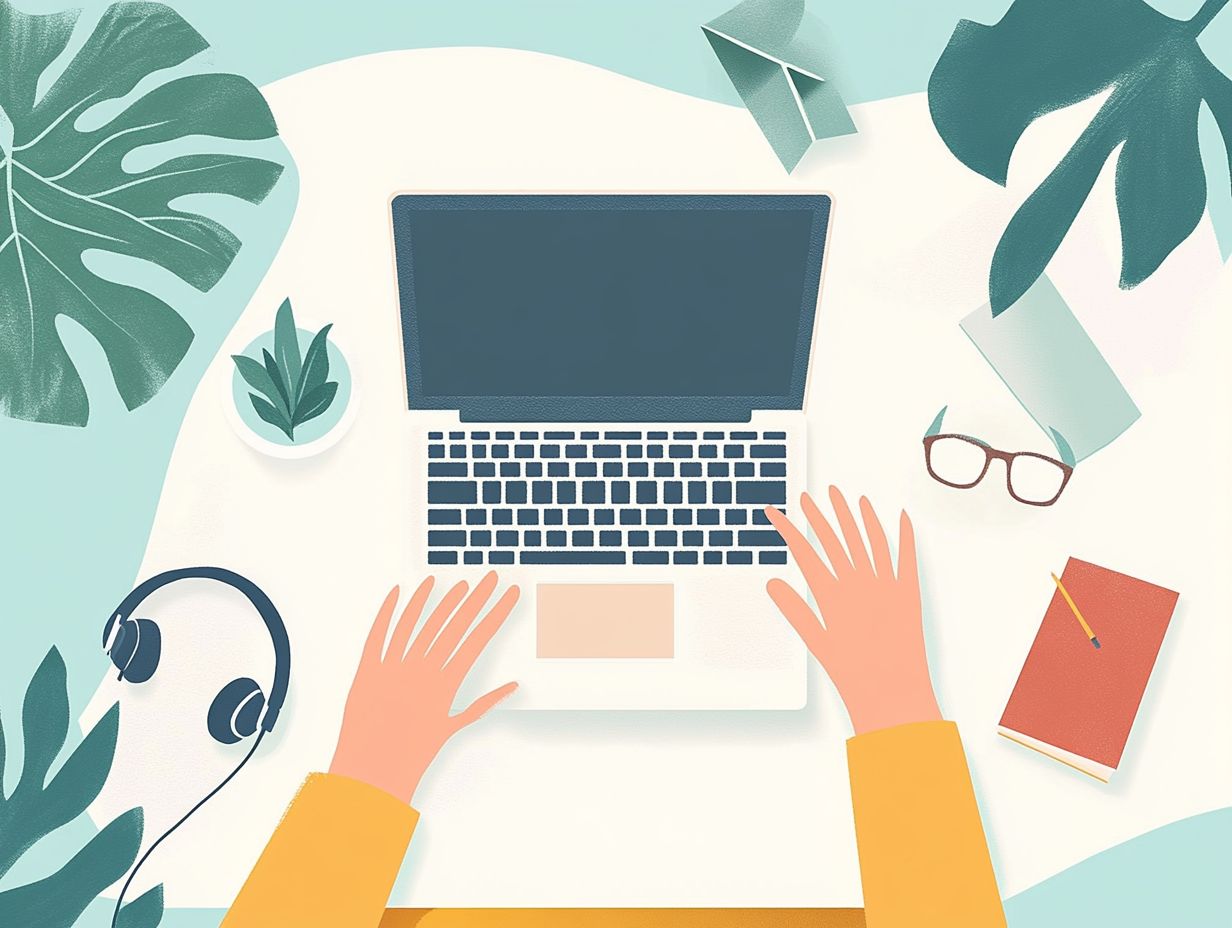
The impact of distractions on your productivity and mental health is profound, especially for college students navigating a sea of challenges while trying to maintain focus.
In an environment saturated with constant notifications, social media allure, and academic pressures, you may find yourself grappling to balance your responsibilities. This fragmentation of attention can increase stress and anxiety as tasks accumulate and deadlines approach.
By implementing focus strategies like designating specific study times and breaking tasks into manageable segments you can alleviate these negative effects. Cultivating a culture of self-regulation through mindfulness techniques allows you to develop a deeper awareness of your mental state, ultimately enhancing your time management skills and safeguarding your mental well-being.
Techniques for Limiting Distractions
Implementing effective techniques to limit distractions is crucial for you as a student aiming to optimize your study sessions and enhance accountability in your academic journey.
By honing in on strategies that minimize interruptions, you can create a focused environment that fosters productivity and supports your goals.
Creating a Distraction-Free Environment
Creating a distraction-free study environment is essential for enhancing your focus and productivity as a college student.
By implementing key strategies, you can significantly elevate your study sessions and overall academic performance. For instance, minimizing background noise is crucial; consider investing in noise-canceling headphones to craft an auditory oasis that promotes deeper concentration.
Employing effective organization techniques like maintaining a decluttered workspace and using planners or digital tools to schedule your study times can greatly diminish mental clutter.
A conducive study space not only fosters mental clarity. It also cultivates a sense of calm, making it easier for you to absorb complex material and retain information more efficiently.
Establishing Boundaries and Prioritizing Tasks
Establishing boundaries and prioritizing tasks are essential strategies for you to manage distractions effectively and enhance your study efficiency.
By designating specific time slots for technology usage, you can better resist the temptation to check your devices constantly. Limiting access to social media during your study sessions significantly minimizes interruptions, allowing you to dive deeper into your academic responsibilities.
Using prioritization methods, like creating lists or employing priority lists, enables you to identify pressing assignments and focus your energy on the tasks that offer the greatest academic rewards.
This structured approach not only curbs procrastination but also fosters improved focus, giving you the power to navigate your studies with greater effectiveness while maintaining a balanced relationship with technology.
Mindfulness Practices for Overcoming Distractions
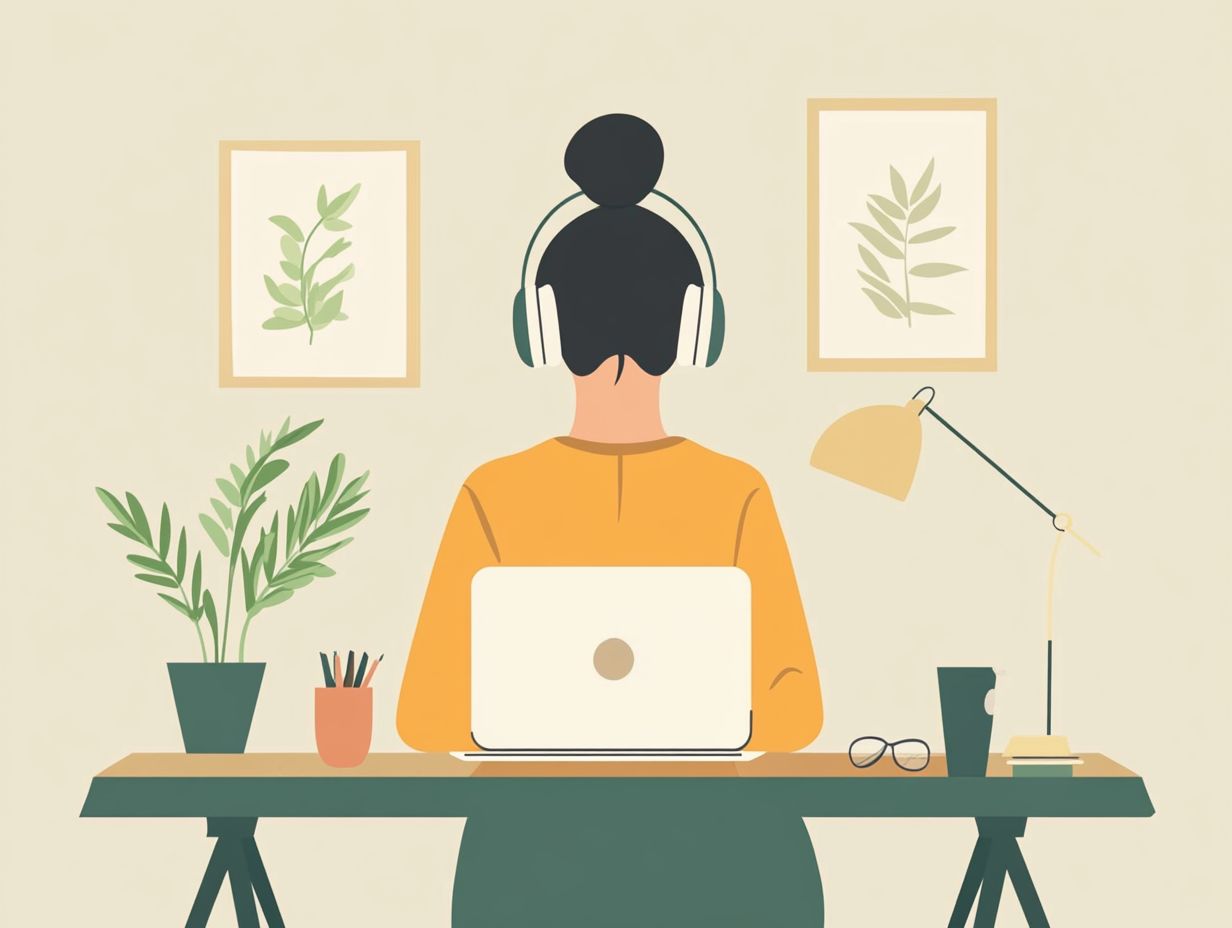
Mindfulness practices are invaluable resources for college students striving to conquer distractions and elevate their focus during study sessions. By incorporating these techniques into your routine, you can cultivate a deeper sense of awareness, allowing you to engage more fully with your studies and optimize your learning experience.
Techniques for Staying Focused and Present
Implementing effective techniques for maintaining focus in a distracting environment can significantly enhance your ability to manage distractions during study sessions.
By integrating mindfulness practices with various focus strategies, you can create a harmonious study environment that promotes greater concentration. For instance, incorporating movement exercises like gentle stretches or yoga can invigorate both your body and mind, alleviating feelings of stagnation.
Listening to focus music has also proven to improve information retention and help maintain a steady rhythm of productivity. Using the Pomodoro technique, which involves studying for 25 minutes followed by a 5-minute break, allows you to balance concentrated study periods with brief breaks, enabling mental rejuvenation.
Together, these methods encourage sustained attention, ultimately giving you the power to achieve your academic goals with remarkable ease.
Seeking Professional Help for Chronic Distractions
For college students grappling with persistent distractions that significantly hinder academic performance and mental well-being, seeking professional help is crucial for regaining control of your studies and mental health.
When to Consider Therapy or Counseling
Understanding when to seek therapy or counseling can profoundly enhance your ability to manage distractions and elevate both your academic and personal life.
It s essential to recognize signs such as severe procrastination, overwhelming stress, or persistent distractions. These behaviors often hint at deeper mental health concerns that, if ignored, could significantly impede your academic performance and personal development. In such instances, therapy provides a sanctuary for you to delve into your challenges.
With customized strategies and techniques, you can cultivate accountability and develop effective methods to reclaim your focus and motivation. By addressing these underlying issues, you ll build resilience and navigate the complexities of college life with greater ease.
Frequently Asked Questions
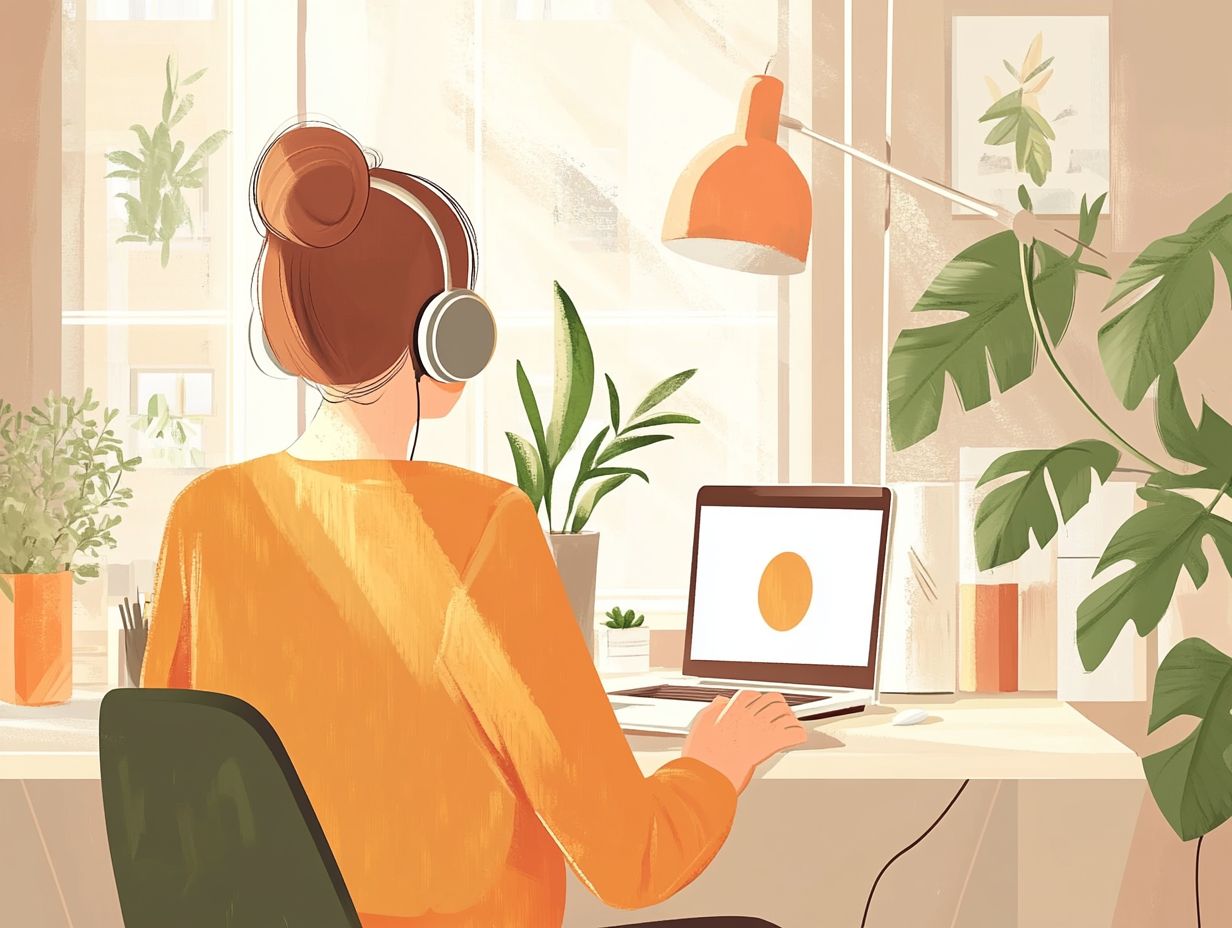
What are some effective techniques for overcoming distractions?
Try creating a specific place to work. Stick to a schedule and use time management methods like mindfulness to stay on track!
How can I create a distraction-free workspace?
Find a quiet, clutter-free area to focus. Keep your workspace organized and remove distracting items.
What is the Pomodoro Technique and how can it help with distractions?
The Pomodoro Technique involves working for 25 minutes followed by a 5-minute break. This method keeps you focused and energized!
How can practicing mindfulness and meditation help with distractions?
Mindfulness helps you recognize your thoughts better. It allows you to manage distractions effectively and regain focus.
What are some tips for managing distractions while working?
Turn off notifications and set specific times to check emails or social media. Consider using noise-cancelling headphones!
Why is it important to take breaks when trying to overcome distractions?
Taking breaks prevents burnout and helps you refocus. Step away from distractions for a fresh perspective!




